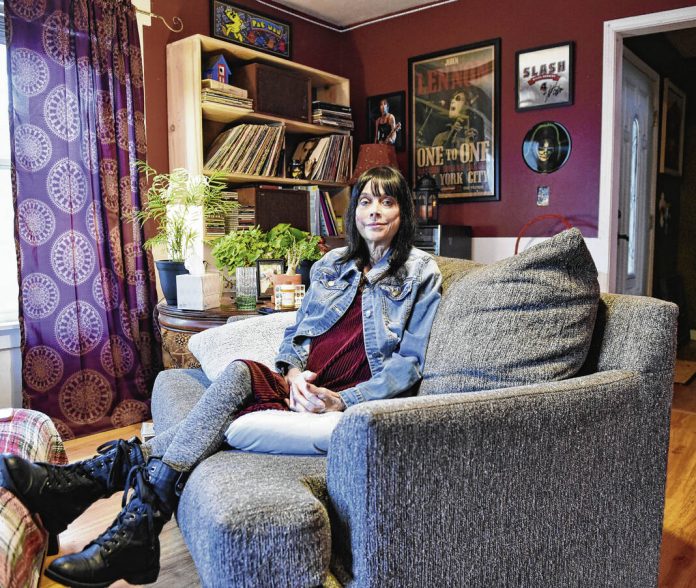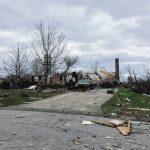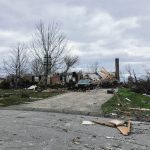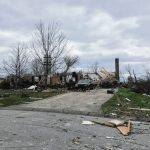The biggest fear was confirmed.
For years, as Robin Napier had struggled with mysterious maladies, she was most frightened that doctors would find a tumor. Even as her issues were diagnosed as everything from early menopause to irritable bowel syndrome to depression, she would break down, begging her husband Rob to assure her it wasn’t cancer.
But finally doctors were able to pinpoint the rare cancer causing her problems. And Napier felt a sense of relief.
“When I was diagnosed, my husband and I told our girls. We cried a bit, but I was OK. We just had to go from there,” she said. “I’ve had my ups-and-downs, I’ve cried. But I’m stronger as a person, I’m stronger in my faith. I love harder, I live harder. My biggest fear was cancer, and I faced it. What else is there to be afraid of?”
In May, the Trafalgar resident was diagnosed with neuroendocrine cancer, an incredibly rare form of the disease also known as NETS. Initially found on her pancreas, the tumor has spread around her spine, making it inoperable. Cancerous lesions have also spread to her liver, in her chest wall, her hip bones and in a few lymph nodes on her throat.
Complications from the disease have forced her to undergo surgery to reroute her bowels, as the tumor had made eating almost impossible. Every day, she has to drain fluid from her abdomen via a surgically implanted port. Most days, she removes about 1 liter of fluid.
Even without a known cure, Napier has chosen to believe the diagnosis is not an immediate death sentence.
“I believe in God, and I have faith that is not going to happen. But the medical field says that is what I’m going to die from. We don’t know if it’s going to be a year, two years, five years, 1o years. You just don’t know,” she said.
Napier, 52, can trace the start of her troubles back nearly three years. She started having severe pains in her stomach, vomiting and having other digestive problems. The issues would flare up then get better, sending her on a rollercoaster ride of health and sickness.
She was in and out of hospitals trying to get an answer for the cause of the pain. No clear reason for her illness could be found.
“They said it was anything from pre-menopause to (irritable bowel syndrome), things like that. I had CT scans, I had ultrasounds. I had every test under the sun,” she said.
In May of 2022, Napier’s stomach started distending — to the point that she looked as if she were nine months pregnant, she said.
Once again, she went searching for answers. A CT scan at the hospital showed a mass on her pancreas, and she was transferred to Ascension St. Vincent Hospital in Indianapolis, one of the only hospitals in the region capable of treating her.
She was admitted to the hospital June 16, and after an endoscopy, found out two days later the mass was cancerous. A biopsy confirmed it a neoendocrine tumor.
Neuroendocrine cancer begins in the specialized cells of the body’s neuroendocrine system, which have traits of both hormone-producing endocrine cells and nerve cells, according to the American Society of Clinical Oncology. They are found throughout the body’s organs and help control many of the body’s functions.
The formation of tumors can happen anywhere in the body, though they are very rare. Napier’s oncologist, Dr. Daniel Milton, told her that only 28 patients in Indiana have this type of cancer.
“They told us it was NETS, and we were like, what is NETS? Is that cancer?” Napier said.
The cancer spread to various parts of Napier’s body, and doctors estimate it had been growing in her body for seven to 10 years. But Milton offered hope — he told her it was a slow-growing, and though it was inoperable, they could offer treatments to help extend her life as much as possible.
“My doctor told me, technology is advancing every day, we’re able to control cancer more than ever,” Napier said. “He said it might be a year, it might be five, 10, 15, 20, 30. But we’re going to fight this together, one day at a time.”
To counter the cancer’s growth, Napier went through one round of 28 radiation treatments in November. She is scheduled to get higher-dose radiation infusions in May. She receives monthly shots of lanreotide, a drug that slows the production of hormones as well as the growth of tumors.
A port was placed in her abdomen, and she has to drain fluid from it every night.
“These are things I have to fight daily, not to mention the fatigue, the brain fog, the nausea,” she said.
In January, Napier was forced to have surgery after the tumor grew too large and was obstructing her bowel. She was vomiting almost every hour and couldn’t keep any food down. The sickness made her lose more than 50 pounds.
“They had to go in and rearrange my pipes so the food could pass around the blockage. He told me, if I didn’t have it, I was going to die,” she said.
Each day brings a bombardment of crises, both large and small, that keeps Napier constantly stressed. To get through it, she has leaned hard on her husband, Rob, who she has known since they were both 15 years old.
Their daughters, Jessie McClain and Shelby Napier, have also been rocks of support for them.
“It’s basically being constantly on alert, it being life and death,” Shelby Napier said.
Napier is lucky enough to have insurance to cover some of the costs of the treatment. But the ordeal has still put a strain on the family financially. The monthly shots of lanreotide cost $10,000 each month. Each sterilized dressing kit and bag she uses to drain her abdomen costs $350 together; she has to use one per day.
The family has set up a GoFundMe to cover the costs of some medications that aren’t covered.
“Thank God I have insurance. If not for that, I’d be in trouble,” she said. “I feel bad for people who don’t have insurance.”
Napier tries to stay positive in the face of an uncertain future. But she can’t help but question what would have happened if doctors had caught this earlier. She replays appointment after appointment where she was told her condition was caused by something else, even if signs pointed to cancer.
In one instance, an ultrasound showed lesions on her liver. The doctor told her it was just fatty liver. Multiple times, blood tests showed elevated white blood cell counts.
Each time, she was told the cause was something outside of cancer.
“It makes me angry that I was misdiagnosed for so long, that if I hadn’t been, maybe something could have happened. Maybe it wouldn’t have gotten as bad as it did,” she said.
Napier doesn’t know how much time she has left, so she’s tried to treat every day as if it may be her last. Still, she’s not giving up; she vows to keep fighting the cancer as long as she can.
’To face death every day is scary,” she said. “It’s something you face and you don’t want to. To know that one day I won’t be here is terrifying. I’m only 52. I don’t want to go yet.”
How to help
Trafalgar resident Robin Napier has been diagnosed with neuroendocrine cancer, or NETS, a rare condition in which tumors form from the specialized cells of the body’s neuroendocrine system, which have traits of both hormone-producing endocrine cells and nerve cells.
To help pay mounting medical costs, the Napier family has set up a GoFundMe page. Anyone looking to donate can do so at https://gofund.me/db7e3bb2








